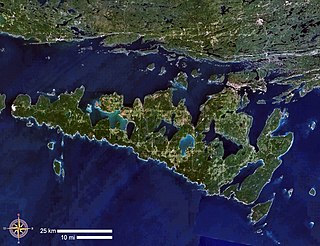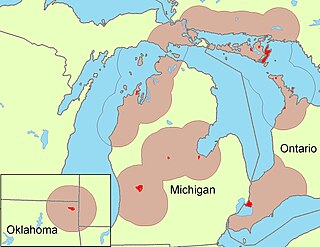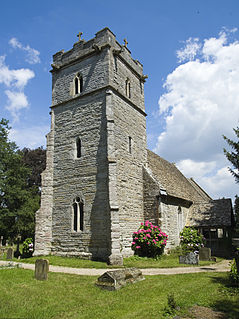
Manitoulin Island is an island in Lake Huron in the Canadian province of Ontario. With an area of 2,766 km2 (1,068 sq mi), it is the largest lake island in the world. In addition to the historic Anishinaabe and European settlement of the island, archeological discoveries at Sheguiandah have demonstrated Paleo-Indian and Archaic cultures dating from 10,000 BC to 2,000 BC.

The Ojibwe, Ojibwa, Chippewa, or Saulteaux are an Anishinaabe people of Canada and the United States. They are one of the most numerous indigenous peoples north of the Rio Grande. In Canada, they are the second-largest First Nations population, surpassed only by the Cree. In the United States, they have the fifth-largest population among Native American peoples, surpassed in number only by the Navajo, Cherokee, Choctaw and Sioux.
Tomson Highway, CM is an Indigenous Canadian playwright, novelist, and children's author. He is best known for his plays The Rez Sisters and Dry Lips Oughta Move to Kapuskasing, both of which won him the Dora Mavor Moore Award and the Floyd S. Chalmers Award.

Georgian Bay is a large bay of Lake Huron, located entirely within Ontario, Canada. The main body of the bay lies east of the Bruce Peninsula and Manitoulin Island. To its northwest is the North Channel.

The Mississauga are a subtribe of the Anishinaabe-speaking First Nations people located in southern Ontario, Canada. They are closely related to the Ojibwe. The name "Mississauga" comes from the Anishinaabe word Misi-zaagiing, meaning "[Those at the] Great River-mouth." It is closely related to the Ojibwe word Misswezahging, which means ‘a river with many outlets.’

The Wiikwemkoong First Nation is a First Nation on Manitoulin Island in northern Ontario. The Wiikwemkoong Unceded Reserve is the First Nation reserve in the north-eastern section of Manitoulin Island in Manitoulin District, Ontario, Canada. Wiikwemkoong is an unceded Indian reserve in Canada, which means that it has not "relinquished title to its land to the government by treaty or otherwise."

Ottawa is a dialect of the Ojibwe language, spoken by the Ottawa people in southern Ontario in Canada, and northern Michigan in the United States. Descendants of migrant Ottawa speakers live in Kansas and Oklahoma. The first recorded meeting of Ottawa speakers and Europeans occurred in 1615 when a party of Ottawas encountered explorer Samuel de Champlain on the north shore of Georgian Bay. Ottawa is written in an alphabetic system using Latin letters, and is known to its speakers as Nishnaabemwin "speaking the native language" or Daawaamwin "speaking Ottawa".

Assiginack is a township in the Canadian province of Ontario, located on Manitoulin Island. An Ontario Historical Plaque was erected on the grounds of the Assiginack Museum by the province to commemorate the Manitoulin Treaties' role in Ontario's heritage.

M'Chigeeng First Nation, also known as West Bay, is an Ojibwe First Nation band government in the Manitoulin District of Ontario, Canada. The total registered population as of December 2018, was 2623 people, of which their on-reserve population was 939. The First Nation have reserved for themselves the 3094.7 ha M'Chigeeng 22 Indian Reserve located on Manitoulin Island.

Crystal Shawanda is a Canadian country music artist. CMT documented her rise to fame in the six-part series Crystal: Living the Dream, which was broadcast in February 2008. Signed to RCA Nashville in 2007, she released her first single, "You Can Let Go", in Canada in January 2008. It was the fastest climbing single on the Canadian Country Singles Chart since Carolyn Dawn Johnson's "Georgia" in 2000, reaching the Top 10 in five weeks. It was released in the United States on February 25, 2008.
Shirley Cheechoo is a Cree actress, writer, producer, director, and visual artist, best known for her solo-voice or monodrama play Path With No Moccasins, as well as her work with De-Ba-Jeh-Mu-Jig theatre group. Her first break came in 1985 when she was cast on the CBC's first nations TV series Spirit Bay, and later, in 1997, she found a role on the CBC's TV series The Rez.

Anishinabe Spiritual Centre is a Roman Catholic centre for Ignatian spirituality and training in ministry run by the Society of Jesus in Espanola, Ontario, specifically for the local First Nation people in the area. It is situated to the south of Espanola, on the shore of Anderson Lake, just off Ontario Highway 6. Since it was founded, it has been the only place in northern Ontario that has offered Roman Catholic ministerial training to Aboriginal peoples in Canada.
Jeannette Corbiere Lavell is a Canadian and Anishinaabe community worker who focused on women's and children's rights. In 2018, she was honoured as a member of the Order of Canada.

The Spanish Indian Residential Schools were part of the Canadian Indian residential school system and one of the 130 schools for First Nations, Métis, and Inuit children that operated in Canada between 1874 and 1996. Operated by the Jesuits of English Canada, the Daughters of the Heart of Mary and the Government of Canada the residential schools operated in Spanish, Ontario from 1913 to 1965.
Anong Beam is an Ojibwe artist and curator from M'Chigeeng First Nation,Ontario.
George Epoch was a Canadian priest, a member of the Jesuit Fathers of Upper Canada. From 1971 to 1983, Epoch abused over 120 children at the Jesuit mission of Wikwemikong and St Mary's church of Cape Kroker and Saugeen, all of which are first nations reserves in Ontario, Canada.
Autumn Peltier is Anishinaabe-kwe and a member of the Wikwemikong First Nation and an internationally recognized advocate for clean water. She is a water protector and has been called a "water warrior". Peltier addressed world leaders at the UN General Assembly on the issue of water protection at the age of thirteen in 2018.


















